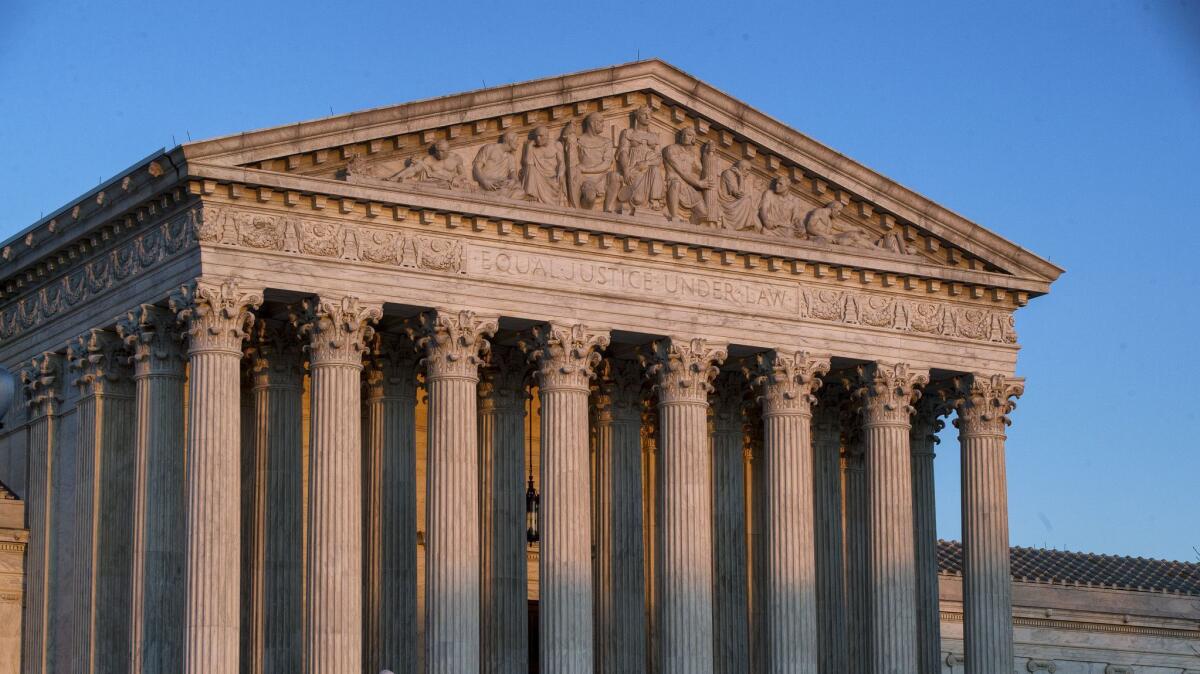Religion in the death chamber: Supreme Court’s 2 rulings, one of which served justice

- Share via
Just a few weeks after horribly bungling a 1st Amendment issue raised by a death penalty case out of Alabama, the Supreme Court made the right call Thursday night in an almost identical case out of Texas.
At issue in both cases were state laws providing for the presence of a religious figure in the death chamber, ostensibly to comfort the condemned (and possibly the executioners as well). In each state, the clerics provided didn’t match the religion of the man condemned to death, and the state refused to allow an appropriate member of the clergy into the highly secure chamber. But the justices allowed Alabama to go ahead with its planned execution of Dominique Ray, while halting Texas’ planned execution of Patrick Henry Murphy.
What’s the difference between the two? The most obvious is the different religions involved — Ray sought to have a Muslim cleric in Alabama’s death chamber; Murphy sought the presence of a Buddhist priest in Texas’. But I doubt that the justices were the least bit swayed by the flavor of faith involved. Nor do I think the justices, who’d been spanked in a blistering dissent by Justice Elena Kagan, were trying to make up for the mistake they’d made in Ray (although George Mason University law professor Ilya Somin makes a good argument on that point).
Enter the Fray: First takes on the news of the minute »
Instead, I agree with attorneys at the Becket Fund for Religious Liberty, who supported Murphy’s appeal to the Supreme Court. According to Eric Rassbach (on Twitter) and Luke Goodrich, one distinction that mattered to the justices is the way the two cases were argued. Specifically, Ray emphasized the part of the 1st Amendment that bars the government from making laws “respecting an establishment of religion”; Murphy stressed the next part, which bars the government from “prohibiting the free exercise thereof.”
Apparently, the justices are not swayed by the argument (as Kagan eloquently articulated it) that picking clergy of a particular faith (Christian, in Alabama’s case) to be present at an inmate’s last moments, regardless of the inmate’s beliefs, amounts to an unconstitutional endorsement of a specific religion. But they are moved by Murphy’s argument that not allowing a Buddhist to have a Buddhist cleric in the death chamber, when Christian and Muslim inmates have that option, prohibits an inmate’s free exercise of religion. As Justice Brett M. Kavanaugh put it in his concurring opinion, “In my view, the Constitution prohibits such denominational discrimination.”
In an interview, Goodrich noted that opponents of President Trump’s travel ban had also based their challenge on the Establishment clause, only to lose at the Supreme Court. The justices have been much more sympathetic to claims that rely on the Free Exercise clause and the federal statutes that give it teeth, such as the Religious Freedom Restoration Act of 1993 and the Religious Land Use and Institutionalized Persons Act of 2000.
I am not a lawyer (insert your joke here about my claim to be a journalist), so perhaps I am missing something important here. And as Goodrich noted, “The court often is limited by the options presented to it by the parties.” But it bothers me that the justices would come to different conclusions on nearly identical facts simply because the attorneys involved emphasized different parts of a sentence in the Bill of Rights.
Alabama has since altered its approach to clergy in the death chamber, so there may no longer be a problem. Yet the fact remains that the justices overturned the 11th U.S. Circuit Court of Appeals on a technicality (allegedly late filing) that they waved off in the Texas case, untroubled by the state’s decision to pick which faith tradition would be represented in the execution room. It was only when a Texas inmate complained about discriminatory treatment in his religious practice that the justices sat up and took notice.
More to Read
A cure for the common opinion
Get thought-provoking perspectives with our weekly newsletter.
You may occasionally receive promotional content from the Los Angeles Times.











